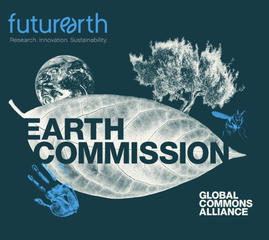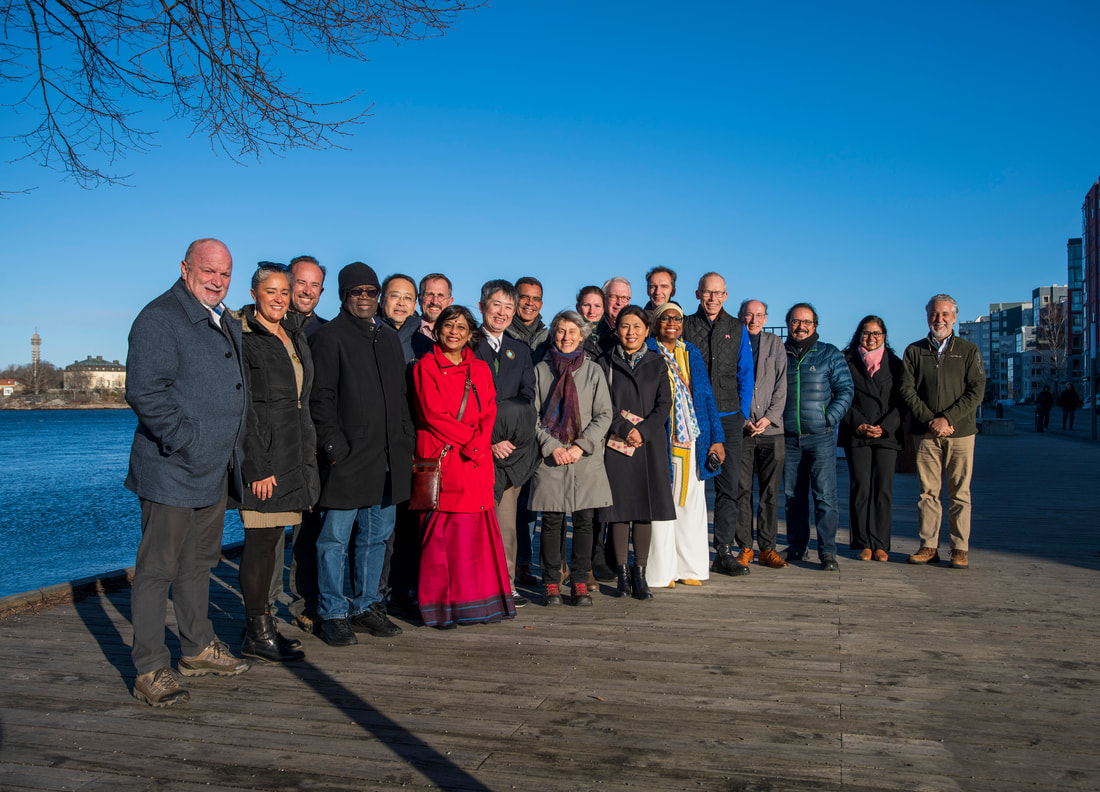DIAMOND NEWS - March 2024
Future Earth announces Earth Commission second assessment with a new cohort of experts.
March 26, 2024
March 26, 2024

We would like to congratulate Professor Miriam Diamond for being named an Earth Commissioner!
Appointed and hosted by the global research network, Future Earth, and serving as the scientific cornerstone of the Global Commons Alliance, the Earth Commission is proud to announce the initiation of its second assessment.
In May 2023 the Earth Commission - a broad group of international researchers from the natural and social sciences - launched the Safe and Just Earth System Boundaries for climate, biodiversity, freshwater, nutrients and aerosols. These quantified boundaries were published in Nature and provide one of the most holistic measurements of Earth’s finite limits, marking a step change in understanding how to protect people and the planet. The Commission’s second major study has been accepted for publication, expected to be public in May 2024.
Appointed and hosted by the global research network, Future Earth, and serving as the scientific cornerstone of the Global Commons Alliance, the Earth Commission is proud to announce the initiation of its second assessment.
In May 2023 the Earth Commission - a broad group of international researchers from the natural and social sciences - launched the Safe and Just Earth System Boundaries for climate, biodiversity, freshwater, nutrients and aerosols. These quantified boundaries were published in Nature and provide one of the most holistic measurements of Earth’s finite limits, marking a step change in understanding how to protect people and the planet. The Commission’s second major study has been accepted for publication, expected to be public in May 2024.
Building on this strong foundation, the Earth Commission’s second assessment will refine and expand on the safe and just boundaries by:
The renewed scientific workstreams will take into account the complex interactions between natural and social systems, justice, and human well-being to enhance the holistic Earth system boundaries framework under the following clusters
Read more about the workstreams here.
- Quantifying boundaries for new Earth System domains such as Novel Entities (including toxic substances) and the Ocean
- Increasing its focus on the just transformations necessary across all of society
- Highlighting the justice, governance and economic requirements for those transformations.
The renewed scientific workstreams will take into account the complex interactions between natural and social systems, justice, and human well-being to enhance the holistic Earth system boundaries framework under the following clusters
- Safe and Just Boundaries
- Transformation Pathways
- Justice, Governance and Economics
- Translation, Actors and Agency
Read more about the workstreams here.
|
New cohort of experts embark on the second phase of scientific analysis
The new cohort of experts embarking on the second cycle of scientific assessment was appointed by Future Earth, drawing on nominations from across and beyond its global research networks (over 160 nominations were considered). The final group, combining re-appointed and new Commissioners, was approved by the Directors’ Council of Future Earth. To co-lead this next phase of scientific enquiry, the Earth Commission is delighted to have recently welcomed Prof. Fatima Denton from United Nations University to join Prof. Johan Rockström as Co-chair of the Commission. Joining them are a renewed cohort of expert natural and social scientists who will bring significant scientific expertise as new and previous Commissioners collaborate through the series of key workstreams. |
IPCP Webinar: Setting the Stage for the Science-Policy Panel on Chemicals and Waste
March 22, 2024
You are invited to join a webinar "Setting the Stage for the Science-Policy Panel on Chemicals and Waste" on April 4, 2024 at 14:00-15:30 CEST, organized by the IPCP. The webinar is intended to provide input for the upcoming 3rd and last scheduled meeting of the Open-Ended Working Group for establishing a science-policy panel (SPP) on chemicals, waste and pollution prevention, which will take place in Geneva, June 17-21, 2024.
The SPP will have several functions, including "horizon scanning", "conducting assessments of current issues” and “identifying potential evidence-based options to address, where possible, those issues, in particular those relevant to developing countries".
Our webinar will feature Katerina Sebkova (RECETOX, Masaryk University, Brno, Czech Republic), Christina Ruden (Stockholm University, Stockholm, Sweden), Rachel Radvany (CIEL, Geneva, Switzerland - invited) and Robert Watson (Senior Advisor, SPP), who will share their ideas on the potential topics for the SPP assessments and outputs they would like to see.
Please register for the webinar via the link below. We look forward to your involvement in an interesting and lively discussion!
IPCP Webinar: Setting the Stage for the Science-Policy Panel on Chemicals and Waste
DATE: Thursday, April 4
TIME: 14:00-15:30 CEST
REGISTRATION: All participants must register: https://tinyurl.com/IPCP-webinar. If you cannot access the registration form, please email us at [email protected] and provide the following information: Your name, Academic degree, Personal pronouns, Position, Affiliation, Sector, City, Country.
RELEVANT IPCP POLICY BRIEFS:
Prerequisites for an Effective Science-Policy Panel on Chemicals, Waste and Pollution, https://www.ipcp.ch/activities/ipcp-policy-briefs-spp-prerequisites
Priority Setting Models for the New Science-Policy Panel on Chemicals, Waste and Pollution Prevention – Learning from IPCC and IPBES, https://www.ipcp.ch/activities/priority-setting-models-for-the-new-science-policy-panel
Conflicts of Interest in the Assessment of Chemicals, Waste and Pollution, https://www.ipcp.ch/activities/ipcp-policy-brief-conflicts-of-interest-in-the-assessment-of-chemicals-waste-and-pollution
March 22, 2024
You are invited to join a webinar "Setting the Stage for the Science-Policy Panel on Chemicals and Waste" on April 4, 2024 at 14:00-15:30 CEST, organized by the IPCP. The webinar is intended to provide input for the upcoming 3rd and last scheduled meeting of the Open-Ended Working Group for establishing a science-policy panel (SPP) on chemicals, waste and pollution prevention, which will take place in Geneva, June 17-21, 2024.
The SPP will have several functions, including "horizon scanning", "conducting assessments of current issues” and “identifying potential evidence-based options to address, where possible, those issues, in particular those relevant to developing countries".
Our webinar will feature Katerina Sebkova (RECETOX, Masaryk University, Brno, Czech Republic), Christina Ruden (Stockholm University, Stockholm, Sweden), Rachel Radvany (CIEL, Geneva, Switzerland - invited) and Robert Watson (Senior Advisor, SPP), who will share their ideas on the potential topics for the SPP assessments and outputs they would like to see.
Please register for the webinar via the link below. We look forward to your involvement in an interesting and lively discussion!
IPCP Webinar: Setting the Stage for the Science-Policy Panel on Chemicals and Waste
DATE: Thursday, April 4
TIME: 14:00-15:30 CEST
REGISTRATION: All participants must register: https://tinyurl.com/IPCP-webinar. If you cannot access the registration form, please email us at [email protected] and provide the following information: Your name, Academic degree, Personal pronouns, Position, Affiliation, Sector, City, Country.
RELEVANT IPCP POLICY BRIEFS:
Prerequisites for an Effective Science-Policy Panel on Chemicals, Waste and Pollution, https://www.ipcp.ch/activities/ipcp-policy-briefs-spp-prerequisites
Priority Setting Models for the New Science-Policy Panel on Chemicals, Waste and Pollution Prevention – Learning from IPCC and IPBES, https://www.ipcp.ch/activities/priority-setting-models-for-the-new-science-policy-panel
Conflicts of Interest in the Assessment of Chemicals, Waste and Pollution, https://www.ipcp.ch/activities/ipcp-policy-brief-conflicts-of-interest-in-the-assessment-of-chemicals-waste-and-pollution


